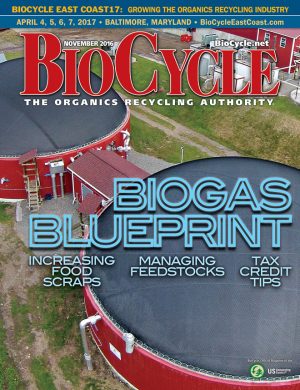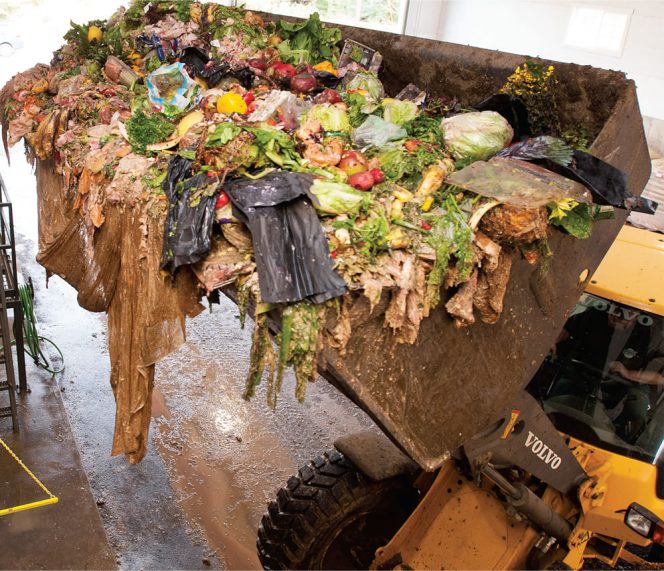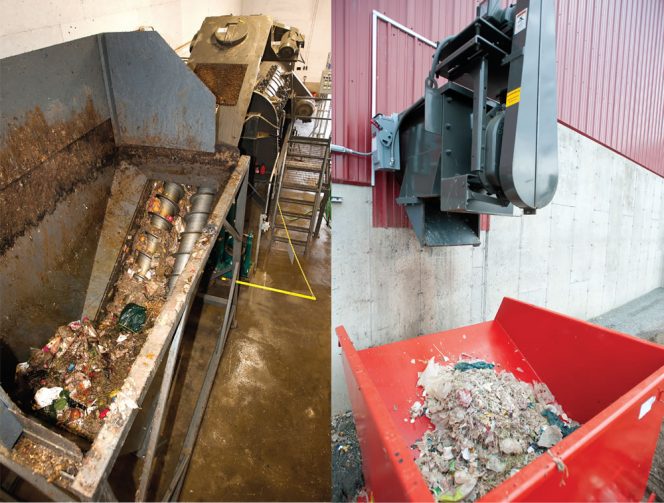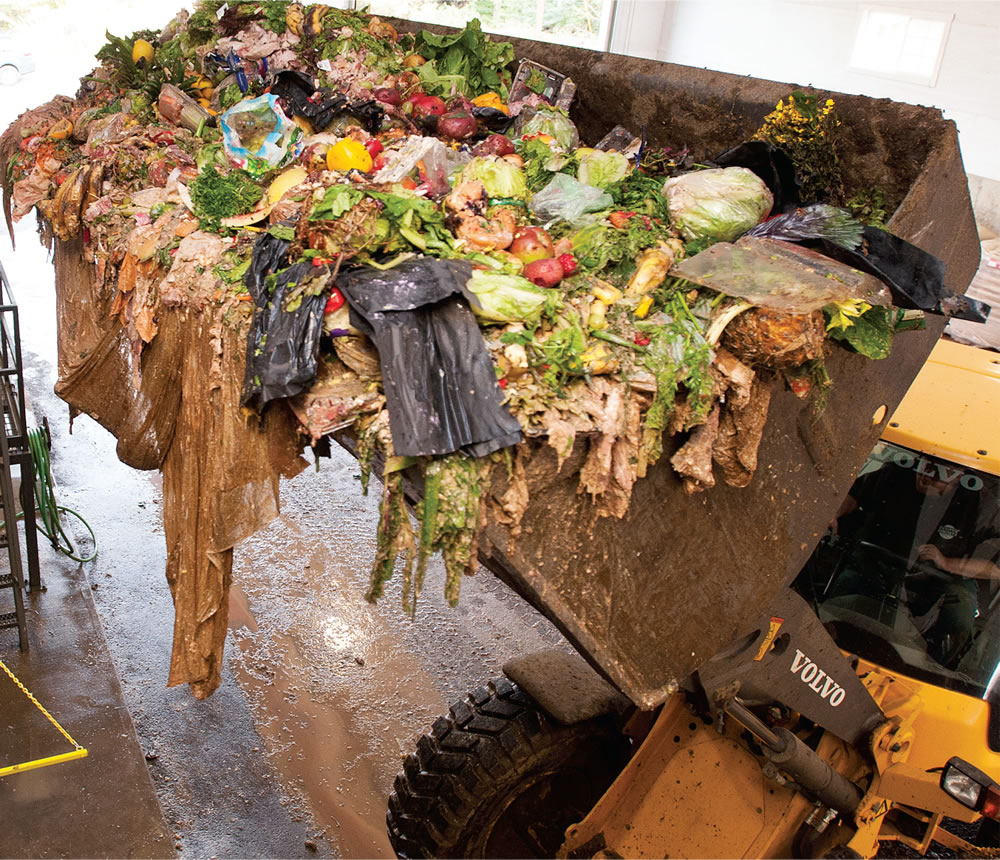A new contract with ecomaine, a regional solid waste authority, is increasing the flow of food waste to an agricultural digester facility in Exeter, Maine.
Craig Coker
BioCycle November 2016

Stonyvale Farm is a 1,950-head dairy in Exeter, Maine that has been run by the Fogler family for five generations. In 2008, brothers Adam and John Wintle, grandsons of one of the Fogler founders of Stonyvale Farm, started a new subsidiary, Exeter Agri-Energy, to develop an anaerobic digestion (AD) facility to process the dairy manure into biogas to make electricity. Three years later, in 2011, Exeter Agri-Energy opened the AD facility, which consists of two 400,000 gallon liquid completely mixed tank AD reactors supplied by CH Four Biogas.
The digestate (7% total solids (TS)) is dewatered using a screw press, with the effluent recycled for land application on the farm and the solids (30% TS) utilized as animal bedding. The biogas consists of 65 percent methane, with 600 to 700 ppm of hydrogen sulfide (H2S). Moisture is condensed out of the biogas, and oxygen is used to oxidize the H2S to elemental sulfur prior to the biogas being combusted in two 1 MW Guascor combined-heat-and-power (CHP) generators. Exeter Agri-Energy has a 20-year fixed rate Power Purchase Agreement (PPA) with Emera to export up to 3 MW.
This facility can generate 4 to 6 million BTUs of heat per hour and up to 30,000 kilowatt hours per day. Captured heat is used to heat the reactors and the liquids receiving tanks. “Routine power production is about 1,250 kW; 1,000 kW goes to the grid and the additional 250kW provides digester and farm parasitic energy loads,” notes Adam Wintle. “Soon, we will ramp output to the grid towards a total of 1,750 kW or 1.75MW. When the digester is expanded next spring, one additional 1.2MW engine will be installed — for a total of 3.2MW to complete the project.”

Food scraps collected from ecomaine member communities are unloaded on a tipping floor at the waste authority’s waste-to-energy (WTE) plant, and then reloaded into a long-haul truck operated by Agri-Cycle Energy, which brings the material to the digester.
Food Waste Preprocessing
During a visit in March 2013, Exeter Agri-Energy was receiving food wastes from several Hannaford Supermarkets in the region. The food scraps were delivered into a concrete block and floored bunker (500 tons capacity) where a REMU loader attachment shredded them to a 1-inch minus particle size. The shredded scraps were moved by loader to one of two 1,000-gallon in-ground, heated receiving tanks. A 40-hp Baldor chopper pump was used to pump the scraps into the AD reactors.
As the quantities of incoming food wastes continued to grow, Adam Wintle decided to replace the batch loader bucket attachment with a Scott Equipment T-30 Turbo Separator, which can process up to 10 tons/hour. “Our relationship with Hannaford has grown to 50 stores in two states, so we had to be able to offer depackaging, which we simply couldn’t do with the REMU unit,” explains Wintle.

Source separated organics collected through a contract with ecomaine are brought to Exeter Agri-Energy where they are processed to remove contaminants and create a slurry to feed to the digester.
New Collection Initiative
Ecomaine is the solid waste authority in the region where Exeter Agri-Energy is located. It has 57 member communities, and provides trash and recycling services. In 2013, an organics feasibility study was conducted for ecomaine by the author and several others that included evaluating ecomaine’s options for managing residential and commercial food waste. One of the study’s conclusions was that it would be more cost-effective for ecomaine and its member communities to work out food scraps diversion programs directly with merchant processors like Exeter Agri-Energy rather than constructing a new facility. But rather than rely on each of its 21 municipal owner-members and 37 associate and contract municipal members to put together their own programs, ecomaine decided to act as the diversion facilitator, taking the SSO collected in participating municipalities for $55/ton and transferring it to Exeter Agri-Energy from the tipping floor of the authority’s waste-to-energy (WTE) plant in Portland.
“We have been a pioneer of single-sort recycling here in southern Maine,” notes Kevin Roche, CEO of ecomaine. “Adding food waste recovery to our portfolio of services will help our member communities meet the statewide recycling goal of 50 percent by 2021.” Ecomaine selected Exeter Agri-Energy as the merchant processor following a Request For Proposals procurement earlier this year and entered into a five-year contract with the company. The program got underway in September.
Agri-Cycle Energy picks up the food scraps from a dedicated area on the tip floor at the WTE plant, transports them to Exeter Agri-Energy for depackaging and digestion, and returns the separated packaging to ecomaine for combustion. The program initially is being aimed at commercial customers such as supermarkets, restaurants and food processors. But demand for residential service is strong, and with the infrastructure in place, municipal collection programs aren’t far off, said Roche at recent press conference. “One of the reasons we felt this was the time we should launch the program was because there is demand on the edge of their seats waiting for this to roll out,” he noted. “I expect we’ll be able to divert about 50 to 100 tons/week at first.”
SSO that can be diverted via ecomaine includes fruit, vegetables, meats, fish, dairy, breads, pasta, rice, grains, eggshells, coffee grounds and filters, soiled tea bags, jellies and sauces and fats, oils and greases. Ecomaine encourages program participants to put SSO in clear plastic bags to help Exeter Agri-Energy quickly identify any contaminants. Unacceptable SSO components include materials unsuitable for a liquid complete-mix AD system, such as yard trimmings, facial tissues and paper towels, seafood shells, animal carcasses, cat litter and pet wastes, medicines, metals, plastics, and cardboard, which go directly to ecomaine’s WTE plant. “We cleaned both digester reactors in Spring 2016 after five years of operation, and we found that we need to be more vigilant about contamination so as not to compromise our reactor capacity,” explains Wintle.

Exeter Agri-Energy has a Scott’s T-30 Turbo Separator (drum at rear in left photo) that can process up to 10 tons/hour. Contaminants in loads received from ecomaine member communities are transported back to the authority’s WTE facility for combustion (right).
The program is already growing. The Town of Scarborough, Maine, one of ecomaine’s owner-members, has announced a 180-home residential pilot collection program to begin in Spring 2017. The town’s trash hauler, Pine Tree Waste, will handle the SSO hauling to ecomaine. “The Town evaluated switching to a pay-as-you-throw system for solid waste management in 2016,” says Mike Shaw, Public Works Director of Scarborough, “and as part of a Council directive to reduce costs while increasing recycling rates in the town, decided not to adopt such a program in favor of other recycling initiatives, such as ecomaine’s organics recovery and increased education and outreach to Town citizens.”
Agri-Cycle Energy tips its collection trucks with 12 to 15 ton organic payloads at ecomaine and transfers the SSO going to Exeter Agri-Energy into transfer rigs capable of 32 ton loads. “It’s an economic optimization drill because sending collection vehicles to an end disposal site two hours away is not efficient per normal waste industry protocol,” notes Wintle. “Typically, collection trucks will feed disposal sites within a 40 to 60 mile radius, otherwise this transfer and long haul function is introduced.”
Exeter Agri-Energy plans an expansion in 2017 to install two new liquid digester tanks to support expansion to 30,000 gallons/day of manure and 30,000 gallons/day of off-farm organics. With the regional support for SSO diversion to Exeter Agri-Energy, this looks like a good investment. “The limiting factor to reach the 3 MW production level in our PPA has been food waste volumes,” he adds. “But we have gained great momentum through Agri-Cycle Energy’s collection efforts and are well on our way to generating 3 MW.”
Craig Coker is a Senior Editor at BioCycle and CEO of the firm Coker Composting & Consulting (www.cokercompost.com), near Roanoke VA. He can be reached at ccoker@jgpress.com
Correction, December 6, 2016:
The article erroneously reported that The Town of Scarborough, Maine had switched to a pay-as-you-throw system for solid waste management in 2016.











